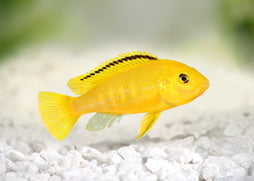Description
The Julidochromis Ornatus Albino is a striking and intriguing species of African cichlid known for its distinctive appearance and relatively peaceful nature but can be Highly territorial, especially during breeding. As a variant of the Julidochromis Ornatus, the albino form is highly sought after in the aquarium trade. This species requires a well-maintained environment to thrive, with attention to water quality, tankmates, and dietary needs. Pairing fish. Needs hiding places. Start with a small group and let them pair off naturally. Below, the key aspects of caring for this beautiful fish are explored in detail.
Shop live aquarium fish online with confidence, with our livestock delivery guarantee.
Features of a Julidochromis Ornatus Albino
-
Albino coloration with pale body and red eyes.
-
Length typically reaches up to 10 cm.
-
Long, streamlined body, characteristic of the Julidochromis genus.
-
Prominent black markings, particularly near the dorsal fin.
-
Relatively peaceful temperament, making it suitable for community tanks.
-
Prefers rocky environments mimicking its natural habitat in Lake Tanganyika.
-
Can display territorial behavior, especially during breeding.
The Best Aquarium Size for Julidochromis Ornatus Albino
A minimum tank size of 100 litres is recommended for a single Julidochromis Ornatus Albino. However, for a pair or small group, an aquarium of 150-200 litres would be more suitable. This allows ample space for the fish to establish territories while ensuring water quality is easy to maintain.
After an Aquarium for your fish? Browse our Aquarium Tank Selection here.
Tank Mate Compatibility for Julidochromis Ornatus Albino
Diet for Julidochromis Ornatus Albino
Julidochromis Ornatus Albino are omnivorous and will thrive on a varied diet. They should be offered:
-
High-quality flake or pellet foods.
-
Frozen or live food like brine shrimp, daphnia, and bloodworms.
-
Vegetables such as spirulina, zucchini, or blanched spinach.
-
Occasional live food to encourage natural hunting behavior.
Browse our High Quality Fish Food online.
Aquarium Setup for Julidochromis Ornatus Albino
Aquarium Filtration
A reliable filtration system is essential to maintain high water quality. A canister filter or internal filter with a capacity of at least 5-6 times the tank volume per hour is recommended. This helps ensure the water remains clear and free of harmful toxins.
Browse aquarium filters here.
Aquarium Plants
While Julidochromis Ornatus Albino will not directly damage plants, their preference for rocky, cave-like structures means that hardier plants like Anubias or Java Fern are ideal. These plants can be placed in more secure spots away from rocks where the fish may establish their territories.
Interested in live plants for your aquariums? Browse live plants here.
Aquarium Lighting
Moderate lighting is sufficient for the Julidochromis Ornatus Albino, as they are more accustomed to dimmer conditions in their natural habitat. Light intensity should be kept moderate to promote plant growth while mimicking the soft, diffuse light found in Lake Tanganyika.
Need aquarium lighting for your fish tank? Browse our Aquarium Lighting.
Aquarium Heating
Water temperatures should be kept between 24°C and 28°C, simulating the natural conditions of Lake Tanganyika. A reliable aquarium heater with a temperature controller is essential for maintaining consistent warmth.
Looking for a suitable fish tank heater? Shop aquarium heaters here
Aquarium Substrate
A fine, sandy substrate is recommended as it mimics the rocky lakebed environment of the fish. Avoid using coarse substrates as they may cause injury to the delicate fish.
Shop a variety of Aquarium Substrates here.
Aquarium Decorations
Rocks and caves should be abundant to provide hiding spaces and territorial boundaries. Julidochromis Ornatus Albino is territorial, and these structures allow them to feel secure while minimizing aggression. Decor should also be placed strategically to avoid overcrowding.
Check out our huge range of Aquarium Ornaments.











